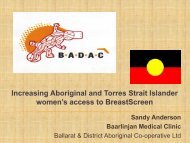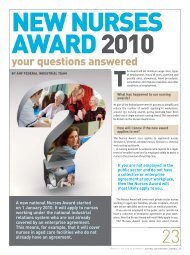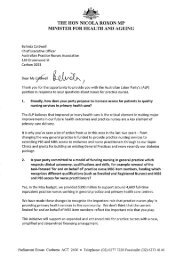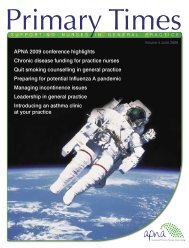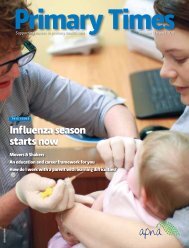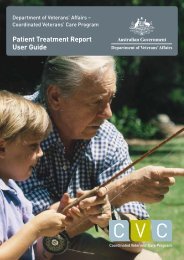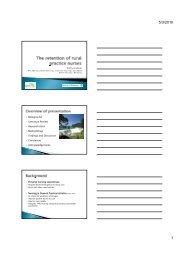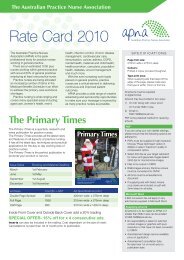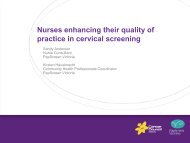September - APNA
September - APNA
September - APNA
Create successful ePaper yourself
Turn your PDF publications into a flip-book with our unique Google optimized e-Paper software.
CLINICAL CARE<br />
is important for healthy sperm<br />
production and motility.<br />
B group vitamins particularly B5<br />
for testicular health and B12 to<br />
increase sperm count and motility.<br />
Omega 3 essential fatty acids<br />
Research has highlighted the<br />
importance of omega 3 essential<br />
fatty acids (EFA) for conception,<br />
pregnancy and breastfeeding. These<br />
‘good fats’ must be obtained in<br />
sufficient quantities in the diet for<br />
healthy fertility, pregnancy and<br />
breastfeeding.<br />
Inadequate maternal and paternal<br />
EFA levels have been associated with<br />
infertility, particularly for men, as a<br />
strong negative correlation has been<br />
established with low omega 3 levels<br />
and total sperm count, motility<br />
and morphology. This is a strong<br />
recommendation for increasing<br />
consumption as part of<br />
preconception preparations.<br />
The metabolic demand for omega<br />
3s, particularly docosahexaenoic<br />
acid (DHA) increases in pregnancy<br />
and during lactation. The benefits of<br />
meeting requirements are many and<br />
varied. A recent meta-analysis of<br />
studies showed that<br />
supplementation with fish oil in the<br />
second half of the pregnancy<br />
resulted in increased length of<br />
gestation and slightly greater birth<br />
weight. Higher maternal intake in<br />
DHA has also been shown to have<br />
beneficial effects on visual acuity,<br />
cognitive function, hand-eye<br />
co-ordination and maturity of sleep<br />
patterns in infants. Supplementation<br />
continuing through lactation<br />
ensured higher concentrations of<br />
DHA in breast milk, in order to<br />
provide for the rapid growth of the<br />
baby, particularly the brain. Human<br />
milk DHA levels have been<br />
positively correlated to visual<br />
development in breastfed infants,<br />
and investigations are continuing<br />
into other areas, such as language<br />
production, comprehension and<br />
cognitive function.<br />
It is recommended that pregnant<br />
and breastfeeding mothers consume<br />
2–3 servings of most types of fish<br />
weekly. Blackmores Conceive Well<br />
Gold and Pregnancy & Breastfeeding<br />
Gold contain a range of<br />
nutrients to support preconception<br />
and pregnancy such as those<br />
mentioned above.<br />
Seniors<br />
There is no doubt that Australia is<br />
faced with an ageing population, and<br />
this demographic has been identified<br />
at a disproportionate risk of<br />
nutritional deficiencies. Ageing is<br />
associated with a decline in a<br />
number of physiological functions<br />
that can impact nutritional status in<br />
addition to medication,<br />
hospitalisation and other social<br />
realities. The nutritional status of<br />
older people is an important<br />
determinant of quality of life.<br />
A study published in the Journal of<br />
the American Dietetic Association<br />
suggested a significant proportion<br />
of people over 50 do not receive<br />
sufficient nutrients from diet alone<br />
and therefore may benefit from<br />
supplementation. Those that did<br />
supplement were more likely to<br />
receive adequate levels of essential<br />
nutrients. Many members of this age<br />
group are motivated to maintain<br />
health and vitality through good<br />
nutrition and are open to nutritional<br />
education.<br />
Key nutrients for seniors:<br />
• Calcium is well recognised for<br />
building strong healthy bones and<br />
preventing osteoporosis, but is<br />
also involved in cardiovascular<br />
health particularly regulation of<br />
healthy blood pressure.<br />
• Co enzyme Q10 is a naturally<br />
occurring nutrient; unfortunately,<br />
human tissue concentrations<br />
decrease with advancing age. This<br />
potent antioxidant is concentrated<br />
in metabolically active tissues and<br />
supports cardiovascular health,<br />
immune function, and energy<br />
levels.<br />
• Increasing evidence supports the<br />
multifactor benefits of optimal<br />
omega 3 EFA consumption,<br />
including a protective role in<br />
cardiovascular health, cognitive<br />
function, visual acuity and<br />
reduction of inflammatory states<br />
such as arthritis.<br />
• Vitamin B12 deficiency is<br />
estimated to affect 10–15% of the<br />
population aged over 60; however,<br />
this can be difficult to diagnose<br />
as the elderly do not frequently<br />
display the classical signs and<br />
symptoms. B12 deficiency may<br />
be a result of atrophic gastritis,<br />
hypochlorhydria and resulting<br />
gastrointestinal dysbiosis binding<br />
B12 and preventing absorption.<br />
Adequate levels are necessary<br />
for cognitive and psychiatric<br />
performance and cardiovascular<br />
health. Food fortification with<br />
folate may further complicate<br />
diagnosis of this deficiency.<br />
• Antioxidants such as vitamin A,<br />
E, carotenes and zinc may be<br />
lowered resulting in lowered<br />
immune resistance to infection,<br />
delayed recovery and poor tissue<br />
healing. Maximising consumption<br />
of these nutrients may support<br />
healthy immune resistance,<br />
recovery from infection and<br />
healthy tissue healing.<br />
Vitamin D<br />
Vitamin D has been identified as a<br />
major deficiency in the ageing<br />
Australian population — possibly<br />
affecting up to 75% of this segment.<br />
Older people are prone to deficiency<br />
due to low dietary intake,<br />
diminished exposure to sunlight,<br />
poor intestinal absorption and<br />
impaired hydroxylation in the<br />
kidneys and liver (conversion of D3<br />
into its metabolically active forms).<br />
One of the most recognised<br />
functions of vitamin D is to mediate<br />
calcium homoeostasis to reduce<br />
likelihood of osteoporosis. This is<br />
achieved via stimulation of intestinal<br />
calcium absorption, reabsorption of<br />
calcium from the kidneys and<br />
regulation of parathyroid hormone<br />
influence on skeletal calcium stores.<br />
Vitamin D supplementation has<br />
been investigated for preservation<br />
of muscle strength and functional<br />
ability. Successful treatment with<br />
vitamin D resulted in clinical<br />
improvement in muscle strength,<br />
walking distance, functional ability<br />
and body sway; therefore identifying<br />
vitamin D as an important nutrient<br />
to reduce risk of bone fracture.<br />
Higher concentrations of vitamin<br />
D have been shown to have a<br />
protective affect on age related<br />
diseases, marking vitamin D as an<br />
‘anti ageing’ vitamin. The American<br />
Journal of Clinical Nutrition<br />
published a study that identified<br />
higher concentrations of vitamin D<br />
with increased telomere length —<br />
a chromosomal marker of ageing.<br />
Researchers conclude that higher<br />
levels of vitamin D may age more<br />
slowly than those with low levels.<br />
The National Health and Medical<br />
Research Council has set the AI<br />
(adequate intake) for vitamin D at<br />
5–15 mcg for adult women and men.<br />
There are two forms of vitamin D.<br />
One is produced by the action of<br />
sunlight on skin (D3 or cholecalciferol)<br />
and the other is found in a<br />
limited range of foods (D2 or<br />
ergocalciferol). With current food<br />
supplies and patterns of eating,<br />
it is almost impossible to obtain<br />
sufficient vitamin D from the diet<br />
alone. Vitamin D in foods is fat<br />
soluble and is biologically less active.<br />
Supplementation provides a reliable<br />
and convenient method to maintain<br />
intake.<br />
Danielle Steedman B. Hlth Sc, Ad Dip NAt,<br />
DBM, DRM, MATMS<br />
Danielle is a naturopath with over 10 years of<br />
experience in clinical practice and the natural<br />
supplement industry. Her interests are women’s<br />
and children’s health, utilising dietary, nutritional<br />
and herbal medicines to educate and motivate<br />
patients to achieve optimal health.<br />
<strong>September</strong> 2010 Primary Times 21



